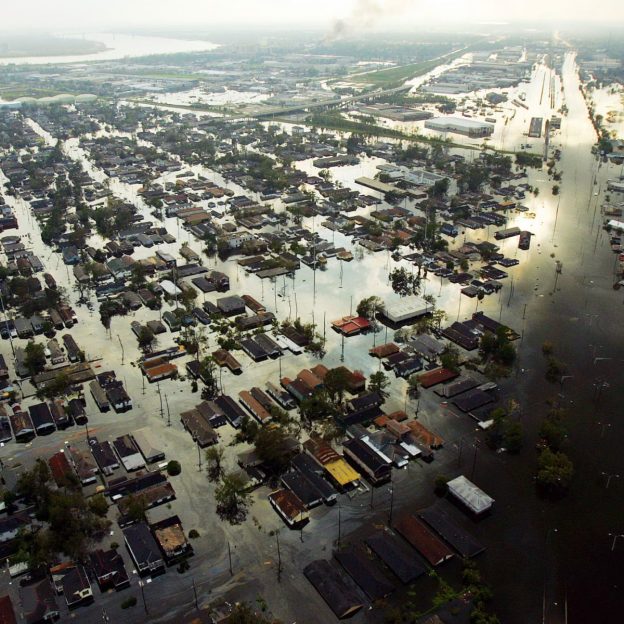For a short while, cable-network correspondents spoke truth to power. Now they’re back to speaking a lot about power and a little about truth. The raw reports filed from New Orleans have been replaced with hosannas to the military (always magnificent) and the Coast and National Guard (ever masterful). Other fumbling officials have redeemed themselves: having failed to rescue the drowning, the dehydrating, and the dying, they’re making up for it by evicting survivors from their homes.
The wagons are being circled; the terms of debate decided. Republicans have framed a demand for accountability as an attempt to “politicize” the Katrina cataclysm. Democrats, as always, refuse to recognize the banality of bureaucratic evil. Their boilerplate battle cry is “racism.” As the factions settle into their familiar foxholes, it becomes crucial to remind Americans that, irrespective of political fidelity, politicians—local, state, and federal—must pay for the lives lost to Katrina.
Justice is the only known palliative.
The culprits will protest. When their heads are on the chopping block, politicians become penal abolitionists. “It’s not us; it’s the system; the system failed” they’ll weasel and wail. The answer to which is, “Hogwash: systems don’t fail; people do.” In this case, lots of them. Private citizens who’ve harmed others are not afforded “the-system-failed” defense. Neither should the system’s stooges. Natural justice demands that government be held to the same legal and moral standards as the governed.
Were the levees privately owned, the companies that had failed to 1) maintain them, and 2) to warn New Orleanians of the consequences of (1) would be facing counts of criminal negligence. If criminal intent is a sticking point in indicting these political perps, settle for negligence, with an emphasis on breach of duty.
The watery graves along the Gulf Coast are proving the best breeding grounds for libertarianism. Pundits have suggested that people ought to be more self-reliant and not trust government. Bravo. But that’s only part of the ethical equation. Remember, these bureaucrats and officials are paid by the public. Yet they watched with depraved indifference as those they were paid to protect expired in ghastly ways. Why should we continue to pony up for agencies that bleed but don’t protect us?
True, the people who died unnecessarily in New Orleans were, mostly, tax consumers, not taxpayers. So shut down Homeland Security and FEMA and return the mismanaged money to its rightful owners, taxpayers. Once that horse’s ass, “Brownie” of FEMA, is back in the stables, and Chertoff is sent home; once their respective fiefdoms have been dismantled—the private sector will be richer and thus able to perform even better than before. (And by gosh, wasn’t private charity as magnanimous as it was swift?!)
Question: why are you, Mercer, who’d like to see the Welfare State wither, seeking to rehabilitate through retribution state apparatchiks? Let them fail. Out of chaos, freedom will flower, as Americans face government’s failure and choose self-reliance.
Answer: Libertarians (I prefer “classical liberal”) haven’t a hope in hell of being taken seriously if they can’t distinguish reality from utopia; what is from what ought to be. The multitudes will not mutiny any time soon. Out of the crisis will come only bigger budgets for Behemoth’s bureaucracies. Accountability will be collectivized and the state further centralized. Face the grubby reality: the “night-watchman state of classical-liberal theory” is a shadow flickering on the wall; the Welfare State is real; as are its transgressions.
And transgressors must be punished.
If anything, punishing the guilty may serve to reduce the ranks of government or, conversely, attract people of “early American probity.” Bureaucrats are subject to the same schedules of reinforcement as the rest of us. Paper over their crimes, and they’ll commit more; punish them proportionally and they’ll likely reform. If recidivism is to be reduced—and the innocent protected—public officials must be penalized.
Just as accountability is being called “politicization” or “the blame game,” expect punishment to be recast as vengeance. Inoculate yourselves against such postmodern piffle. Robert James Bidinotto’s distinction between revenge and moral retribution may help:
Revenge means the carrying out of a bitter desire to injure another for a wrong done to oneself or to those who seem a part of oneself. By contrast, though, retribution suggests just or deserved punishment, often without personal motives, for some evil done.
And some evil was done.
Mens rea may be missing from an indictment of Mayor Nagin, Gov. Blanco, the stumblebum Bush bunch, and Congress. But depraved indifference and criminal negligence are all over the actions of a national legislature and an executive that chose to divert funds from levees to a $286 billion, oink-infused highway bill. Or to divert men and material to Iraq. These conscious choices cost lives.
Unless you’re a commie Keynesian to whom funds are never finite, you understand that we’re into dangerous deficit spending. Every bill signed into law involves (one would hope) excruciating considerations. Someone must be held accountable for deciding against dikes and for turnpikes. And someone must pay for stalling the Red Cross (nogginless Nagin’s orders, methinks) and turning back WalMart’s water-bearing trailer trucks, as babies dehydrated and died.
Please don’t neglect the environmentalists. They’ve been making Katrina cameos on TV, promoting innocuous-sounding wetland projects for New Orleans. A Holy Grail for these humanity-haters is to launch litigation to hinder the construction of hurricane-prevention floodgates and other barrier projects. They’ve succeeded. I happened on a car sporting one of their bumper stickers: “save the planet; commit suicide.” “Save the planet; commit murder” better encapsulates their “philosophy.”
As for our political philosopher-kings, don’t spare their sorry keisters—the dead demand justice.
©2005 Ilana Mercer
September 13
CATEGORIES: Argument, Crime, Criminal injustice, Economy, Government, Justice, Libertarianism, Private Property Rights, Racial issues

 print
print